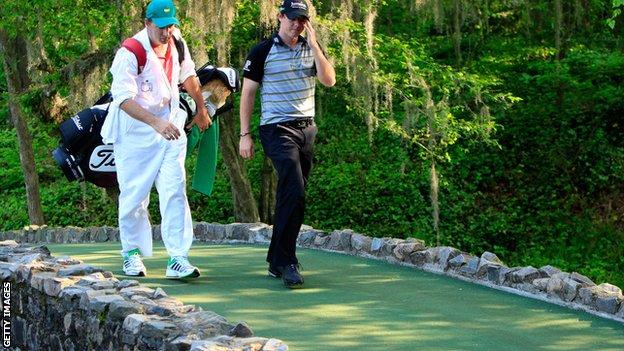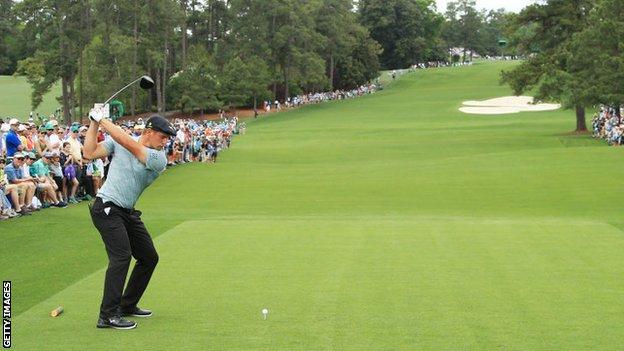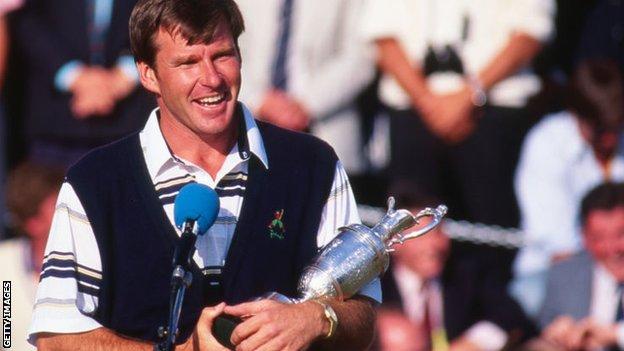

Sir Nick Faldo had planned big celebrations for 2020, the 30th anniversary of the best year of the Englishman’s glorious career, before being thwarted by the coronavirus pandemic.
Instead of marking a successful Masters title defence in 1990 and reminiscing over an epic St Andrews Open triumph in July of that year, Faldo has been, like the rest of us, getting used to golf behind closed doors.
But the shutdown has not prevented the six-time major champion from forming fascinating opinions heading into this week’s delayed Masters at Augusta.
He greatly admires the game changing progression of US Open winner Bryson DeChambeau but wonders whether Rory McIlroy possesses the precision needed to complete the career Grand Slam.
And Faldo insists the prospect of a unique autumnal, fan-free Masters is one to be relished. “Personally, I think it’s going to be great,” Sir Nick told BBC Sport.
“The tour has been happening, the players are well and truly used to playing without a gallery and they’ve already played two majors.”
Those championships – the US PGA and US Open – yielded wins for young Americans Collin Morikawa and DeChambeau respectively. They also passed without McIlroy threatening to add to his current tally of four major titles.
The Northern Irishman has slipped from first to fifth in the world rankings since golf emerged from three months of lockdown in June. There have been only two top-10s in that period.
“When he’s up and hit two or three drives in a row and they’ve gone pounding out there, and he’s popped a couple of putts in, you see the spring in his step,” Faldo observed. “And when he doesn’t he’s emotionally affected.”
But the three-time Masters winner believes the current circumstances might help McIlroy. There has been less pre-Masters hype compared with the usual eight-month build-up to Augusta.

“The Masters is a fantastic opportunity, he’s going to get two cracks at it, November and then April which is not a bad deal,” said Faldo.
“A player like that really needs that extra bit of motivation to get his juices going, so it wouldn’t surprise me if he can find some way to get to the other end of the leaderboard rather than struggling week in, week out.”
This will be McIlroy’s 12th Masters and despite five top-10s he has never finished in the top three.
“It’s all about hitting the right shot all the time and landing it consistently on the right number,” Faldo said.
“That’s one thing I’ve watched in him over the years when he’s warming up on the range. Sometimes the eight-iron, there is too much disparity between the shots.
“On the old range at Augusta there’d be a little green down the left hand side, it was the size of a dinner plate and I’d just be hitting eight and nine irons to that, so I’d get the consistency, literally feeling it off the club.
“You could literally feel plus or minus a yard to that level of distance control,” added Faldo, who won in 1989, 90 and 96.
“And then occasionally he throws a bad drive in. The downswing is the bit that gets him and he’ll block one and that starts to affect confidence in how you release it.”
Developing the theme, Faldo said: “It starts technically and it affects him emotionally. I think he’s the kind of guy who will hit a couple of bad shots and then get down.
“Some guys get very nervous too early and then mentally it can cause them to hit bad shots. So it can work both ways, but I think definitely Rory leans to, oh boy, one too many bad shots.
“And then you get a little down on yourself and then it just kills your momentum. That’s my guess from afar.”
Several observers have suggested that McIlroy, who won the last of his majors with a second PGA title in 2014, may benefit this week from being “under the radar”.
This scenario is largely due to DeChambeau commanding so much attention since his six-stroke US Open victory at Winged Foot in September.

“The poor guy is taking all the rap because he’s made it a real mission, physically,” Faldo said.
“I saw him in May; he’s done all the work to get stronger. He said he’d had a bad back and it took him a year to get his back strong. He studies the science of this game and one of the sciences is physical.
“We know how to build a golfer and how to build a long-driving champion and it’s ‘can I marry the two together? Can I be a long driver and still have the touch to chip and putt?’ That’s what he’s been working on.”
Faldo has been carefully watching the bulked up DeChambeau’s progress. He flew one drive 403 yards in practice for the Masters and has generated ball speed in excess of 200mph.
The results could be devastating at Augusta, where the fairways are relatively wide and the par-fives are already largely gettable.
“In our day, 480 yards was a brutally long par four – a driver and two-iron – now that’s just a driver and a wedge,” Faldo said. “That’s it now, drive it great and have a stack of wedges.
“Just imagine if Bryson hits it 380 at the first and then just a wedge, at the par-five second if he carries the bunker and lands on the downslope, that’ll be an eight-iron approach and then if he drives the third, my goodness.
“I hope he does it because it’ll cause a fantastic atmosphere. The world will be watching on TV.”
Faldo points to technology, the way clubheads no longer ruinously vibrate despite the violence of impact. “The thing doesn’t move now,” he said. “That’s the science of the clubhead moving at 135mph and the shaft being able to cope with that centrifugal force.”
It means an ongoing distance debate, which will only intensify if DeChambeau overpowers Augusta this week.
Faldo wants the best hitters to continue to prosper and has advocated limiting the length of tee pegs to curb current launch angles which help generate so much distance. Long hitting would therefore become a supreme skill.
And for the game in general he is optimistic; enthused by booming participation figures this year. Along with his son Matthew he remains committed to the Faldo Series, promoting junior golf around the world.
“Entry sizes have shot up, for one event in Wales we needed to use two courses,” Faldo said. But the pandemic put paid to the Series grand finals this year, including an event at St Pierrre in Chepstow.
“That’s been a shame but we will just try and push everything forward again and you’ve just got to take a long term view of this,” he said.
In the mean time, Faldo is looking forward to this strange year’s final men’s major. “On paper the course should be in even better condition,” he said.
“They’ve had no ice storms come through, no snow and I guess it will be very green. There’s been no flowering azaleas or anything so it’ll be green on green which I think will probably look fantastic.”
And even without fans the competition will be as intense as ever. “You’re still playing to win the Masters and I promise you that inside you’ll be churning.”
And his own frustration at not being able to celebrate notable anniversaries of triumphs has been salved somewhat by a gesture from former tour pro Ed Sneed.

The American phoned the British star earlier this year to tell him his daughter had worked as a scoreboard operator during the 1990 Open on the Old Course.
As Faldo listened while driving to Golf Channel studios in Orlando, Sneed informed him that she had been allowed to take home a name and score as a souvenir. “She kept ‘Faldo, 18 under,'” he revealed.
“I nearly crashed the car. I said ‘you’re kidding me’ and he asked ‘do you want it?’.
“So I have got from 1990 the ‘Faldo 18 under’ from the leaderboard and I’m so chuffed with it.
“I’m actually going to build an R&A leaderboard and I’ll do it with the slots where you can slide in the names and I’ll get the official R&A yellow paint colour of the scoreboards.
“I couldn’t thank him enough. I love it, I think it’s really cool.”
This week it is all about the famous white scoreboards of Augusta. Which names will be up there? Just as pertinent, what will be their scores? – bbc.com